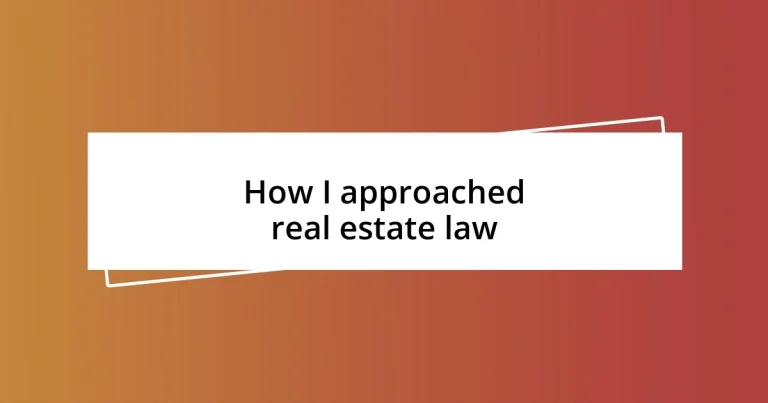Key takeaways:
- Understanding property rights and contracts is crucial in real estate to safeguard investments and navigate legal obligations effectively.
- Building a professional network enhances knowledge and career opportunities; attending industry events and engaging with peers is essential.
- Continuing education and staying updated on regulations and technologies are vital for growth and improving client service in real estate law.
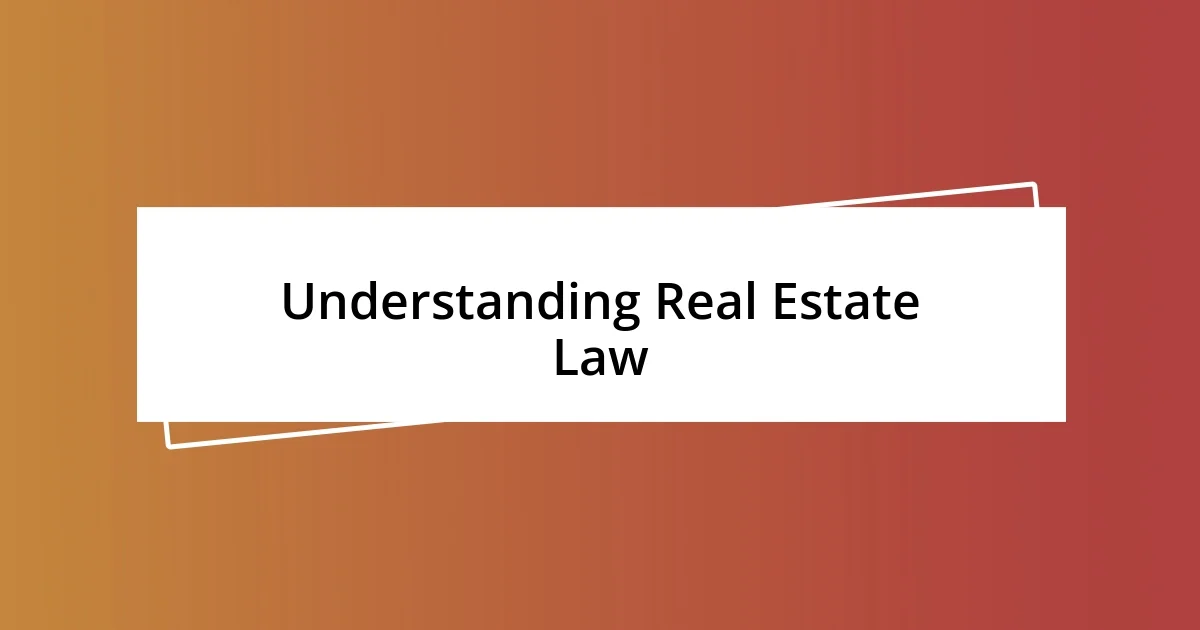
Understanding Real Estate Law
Understanding real estate law can be a bit daunting at first, but it doesn’t have to be. I remember when I first dove in—navigating the complex legal jargon felt like trying to decipher a foreign language. Isn’t it interesting how much we rely on property laws, yet many of us don’t realize their significance until we’re directly involved in buying or selling?
One essential element of real estate law is the concept of property rights. These rights define who owns what and how it can be used. I once faced a situation where a neighbor’s fence encroached onto my property, leading to a discussion that highlighted how boundaries shape our lives. Have you ever wondered why understanding these rights is crucial? It’s because they determine everything from zoning regulations to what you can do with your land.
Another key aspect is contracts. Real estate transactions are often governed by decisions outlined in contracts, which lay the groundwork for legal obligations. I vividly recall a deal where a misunderstood provision could have cost me thousands. It makes you think: how often do we sign things without truly knowing what we’re agreeing to? Knowing the ins and outs of these documents can empower you and safeguard your investments.
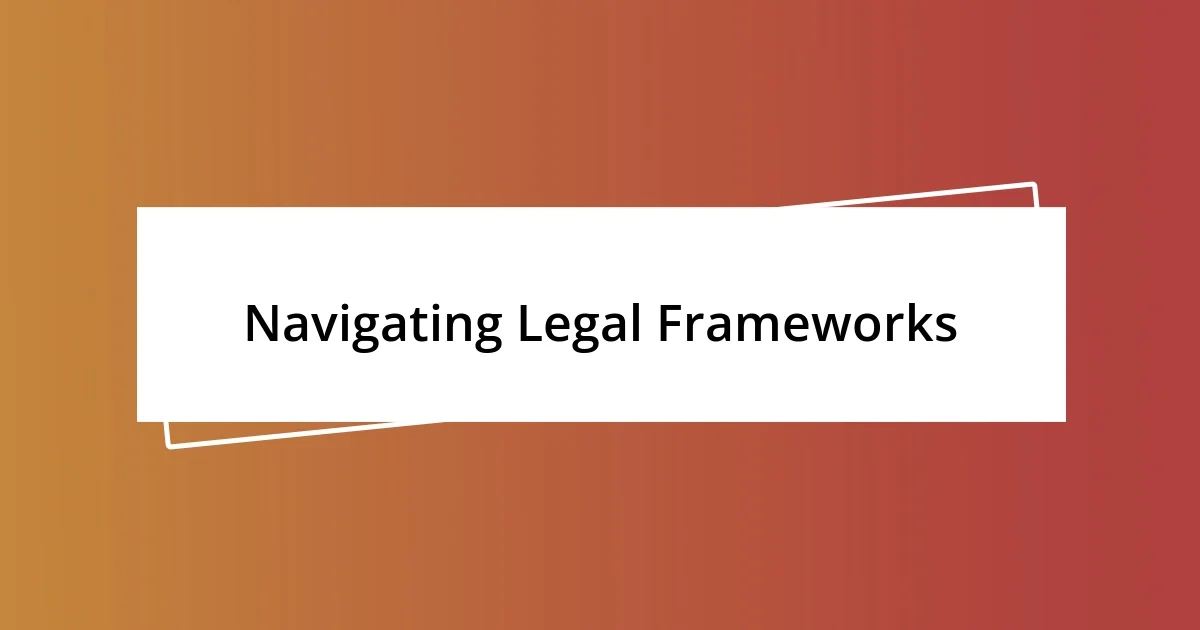
Navigating Legal Frameworks
Navigating through the legal frameworks of real estate can often feel overwhelming. I can still recall my first encounter with zoning laws; I mistakenly assumed they were flexible until I realized they dictated everything from property values to future developments in my area. It’s fascinating how these regulations can alter the landscape of neighborhoods, isn’t it? Understanding these frameworks is crucial for informed decisions.
As I continued my journey, I found that every region has its own set of legal frameworks shaped by local needs and cultural considerations. For instance, in one city, I encountered a restriction that prohibited certain materials in home renovations. This taught me an invaluable lesson: what seems like a minor detail can greatly impact my projects. Isn’t it incredible how local nuances influence our choices in real estate?
When it comes to real estate transactions, I’ve learned the importance of due diligence. I remember conducting a title search for a property that initially seemed pristine; the discovery of an unresolved lien was a wake-up call. It really underlined how a thorough understanding of legal documentation can safeguard you from potential pitfalls. Have you ever considered how much goes unexamined in real estate deals? Each insight gained adds another layer to your protection as a buyer or seller.
| Aspect | Insights |
|---|---|
| Zoning Laws | Can dictate property development and land use |
| Local Regulations | Influence your renovation choices and permit processes |
| Due Diligence | Essential for uncovering hidden issues before closing |
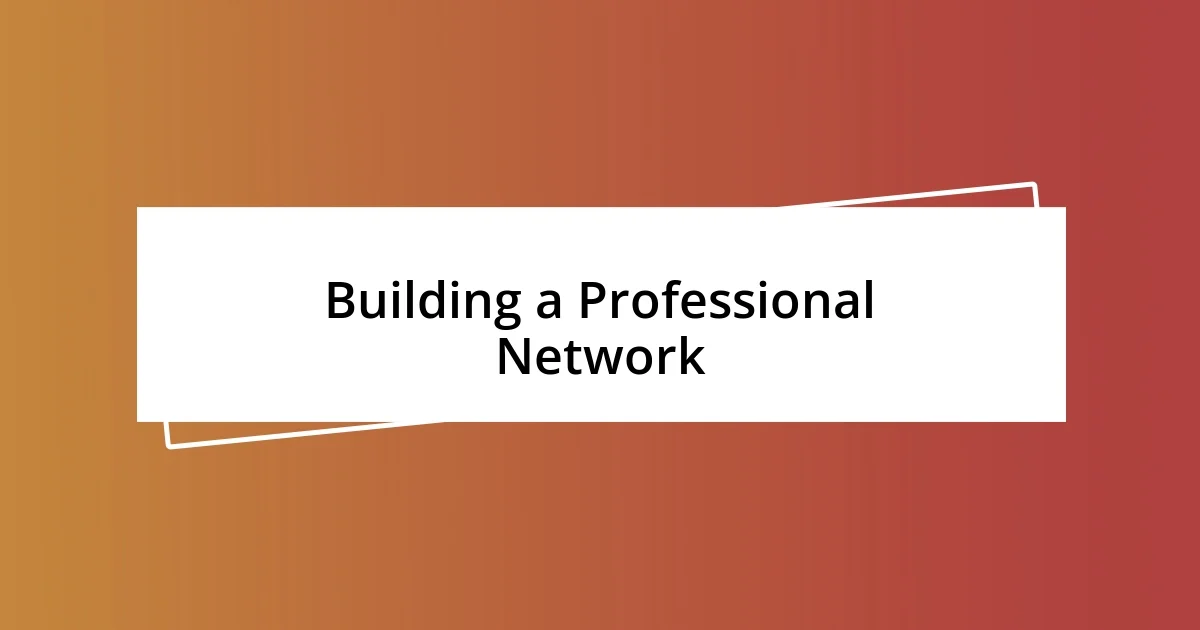
Building a Professional Network
Building a strong professional network in real estate law is an integral step that shaped my journey. When I first started attending industry events, I was astonished by how friendly and welcoming everyone was. I shared a memorable moment at a local conference where I struck up a conversation with a seasoned attorney. That simple exchange opened doors to mentorship opportunities that have profoundly influenced my understanding of real estate complexities.
To effectively connect with others in this field, I suggest focusing on a few key approaches:
- Join Local Real Estate Associations: Meeting like-minded individuals can foster valuable relationships.
- Attend Seminars and Workshops: These events provide insights and opportunities to engage with industry experts.
- Utilize Social Media Platforms: Sites like LinkedIn can help you maintain connections and discover new opportunities.
- Volunteer for Community Projects: Getting involved in local initiatives can build goodwill and expand your network.
- Follow Up Personally: A simple thank-you email can reinforce connections made and keep the conversation going.
I often think back to how those initial connections paved the way for partnerships and collaborations that enriched my career. Networking isn’t just about exchanging business cards; it’s about building relationships that endure and grow over time.
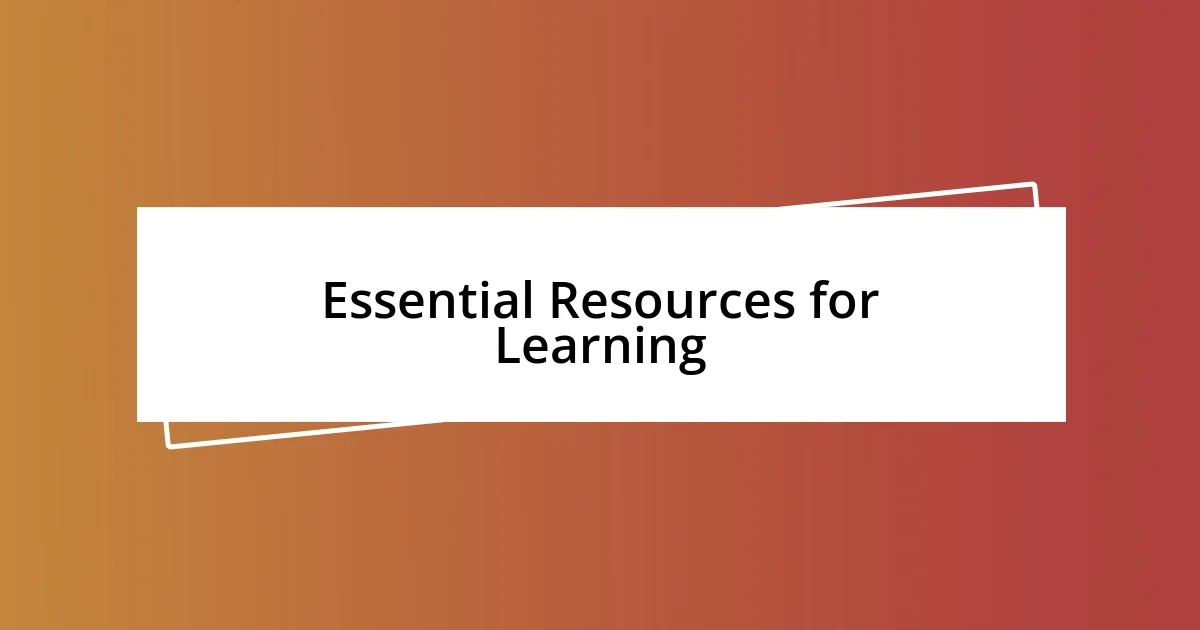
Essential Resources for Learning
When I was diving into real estate law, I realized quickly how important it was to have the right resources at my fingertips. Books became my trusted companions. One title that really made a difference was “Real Estate Law” by Robert J. Aalberts; it breaks down complex concepts into digestible pieces. I recall sitting down with that book one rainy afternoon, and it felt like I was having a conversation with a knowledgeable mentor.
As much as I loved my books, my learning journey expanded when I discovered online resources. Websites like the American Bar Association offer a plethora of articles, webinars, and forums that are invaluable. I remember participating in a live webinar about ethical issues in real estate transactions; hearing experts debate real scenarios broadened my perspective. It’s amazing how online interactions can simulate a classroom environment.
Furthermore, I found that connecting through podcasts was another valuable tool. Listening to episodes where experienced attorneys shared their case studies provided practical insights that written materials couldn’t always convey. One episode featured a lawyer who had navigated a tricky foreclosure case, and I found myself nodding along, absorbing every detail he shared. Have you ever stumbled upon a podcast that made you rethink your approach? For me, these auditory experiences added a dynamic layer to my learning process.
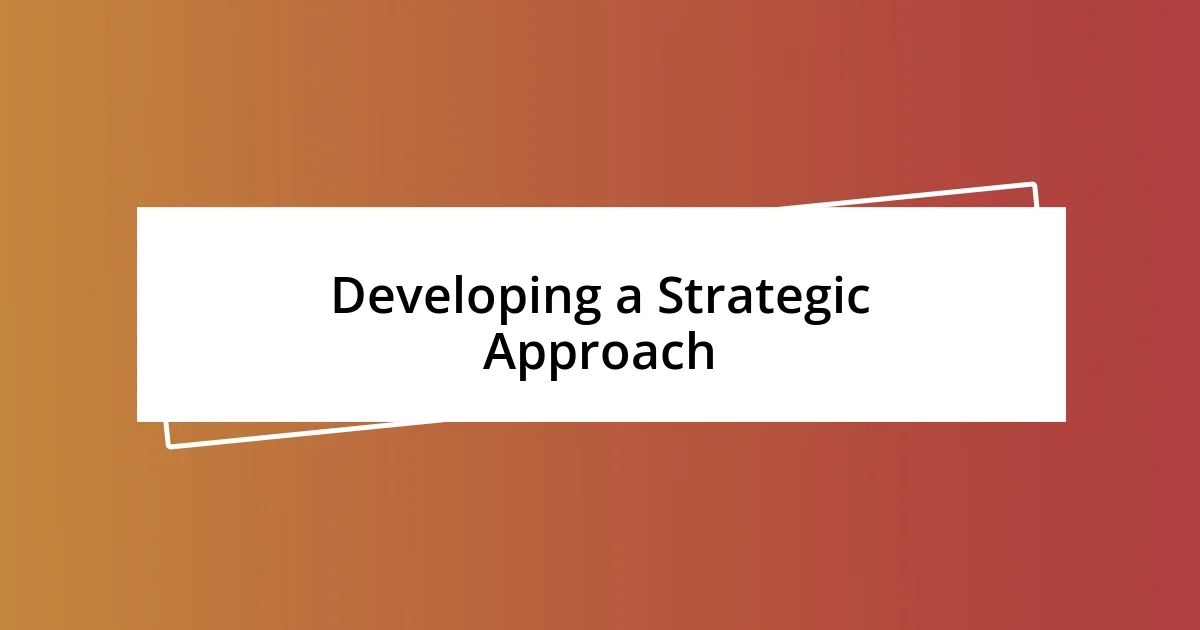
Developing a Strategic Approach
Developing a strategic approach in real estate law is like crafting a tailored roadmap for your career. Early on, I faced the daunting task of figuring out which areas of law I wanted to specialize in. I remember attending a seminar where a veteran real estate lawyer shared his journey, emphasizing the importance of niche expertise. That conversation sparked my realization: focusing on specific aspects like property disputes or zoning laws would not only enhance my skills but also make me a go-to resource in those areas. Have you ever had a lightbulb moment that transformed your perspective? I certainly did.
I also learned the value of continuous reflection and adaptation in my strategy. One case I worked on involved a complex lease negotiation that didn’t go as planned. After that experience, I took a step back to analyze my approach and sought feedback from peers. This process allowed me to refine my strategy, shifting my focus towards better preparation and client communication. It’s fascinating how setbacks can be powerful teachers, isn’t it? They often lead us to a more refined version of our professional selves.
Lastly, I believe that collaboration plays a pivotal role in developing a strategic approach. I reached out to colleagues in related fields—like property management and financial advising—to gain different perspectives on real estate transactions. One enlightening luncheon I attended featured speakers from various backgrounds discussing trends in real estate investments. Learning how others approached their roles helped inform and adjust my own strategies. This reinforces an important point: the more diverse the insights, the richer your strategy becomes. Why limit your perspective when there’s an entire community of experts to learn from?
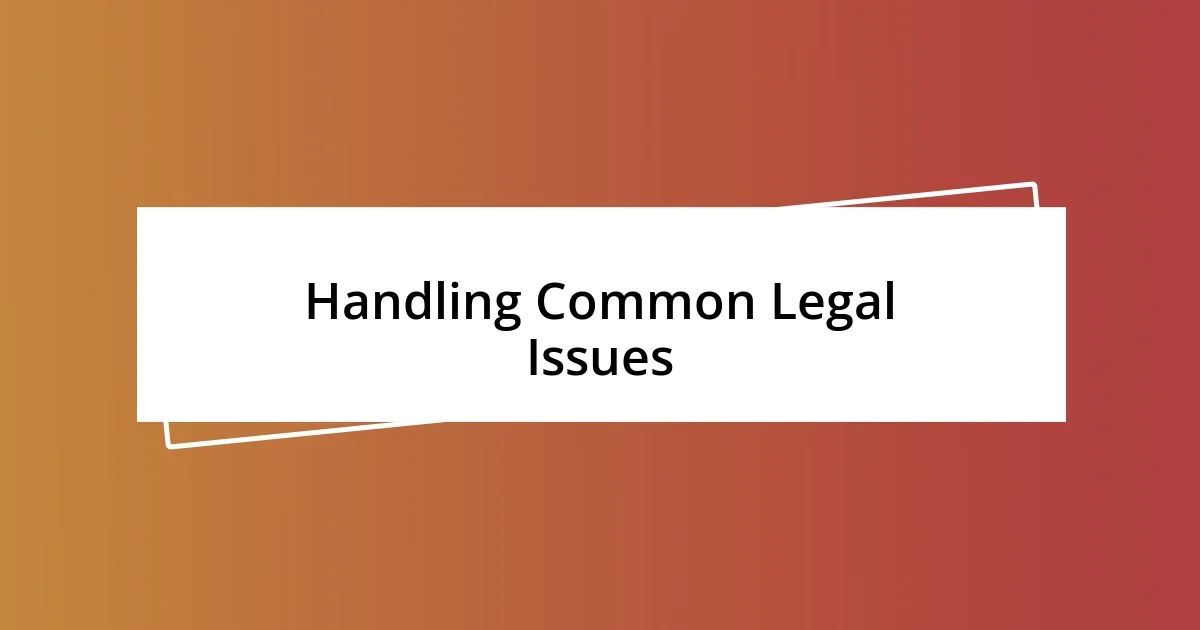
Handling Common Legal Issues
Navigating common legal issues in real estate often felt like walking a tightrope. I vividly recall a case where a client faced unexpected title disputes. The tension was palpable, and I remember the pressure I felt to resolve the situation swiftly. It was in that moment I learned the importance of thorough due diligence before closing deals. The clarity in those documents can save not only time but also your reputation.
Another legal hurdle I encountered involved a tenant-landlord disagreement over lease terms. Engaging in that mediation was a real eye-opener. I discovered that clear communication and empathy could transform a potentially explosive situation into a mutually agreeable resolution. A single conversation helped both parties feel heard and valued. Have you ever had a conflict resolved simply by taking the time to listen? That experience taught me just how vital it is to have strong interpersonal skills alongside legal knowledge.
Sometimes the common issues are less about the law and more about human emotion—the fear of losing a home or the anxiety of investment loss. I once facilitated a workshop aimed at helping new homeowners understand their rights. What struck me was the relief on their faces when they realized they weren’t alone in their concerns. It’s essential to remember that behind every legal issue, there are people with stories and fears. That perspective reminds me that practicing real estate law is not just about regulations; it’s about being a supportive guide through their journey.
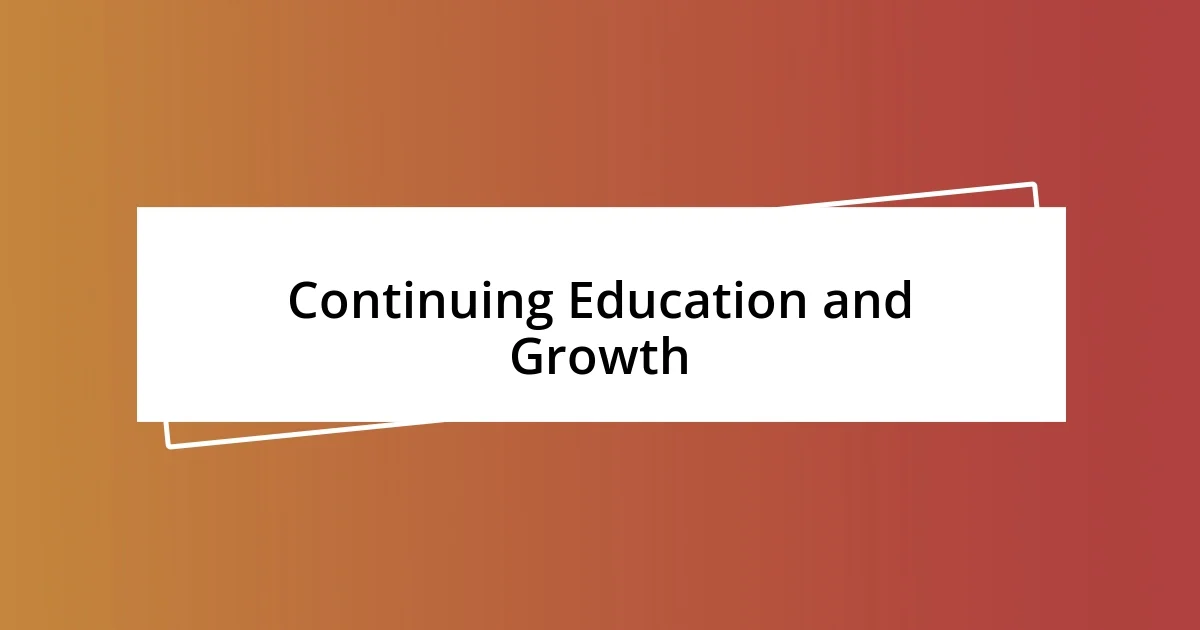
Continuing Education and Growth
Continuing education is a cornerstone of growth in real estate law that I have come to deeply appreciate. I distinctly remember enrolling in an advanced land use planning course—an experience that expanded not only my knowledge but my network, too. The connections we build during these educational experiences often lead to collaborative opportunities. Have you ever considered how a single class can reshape your professional landscape?
As I delved deeper into niche areas, I found value in attending workshops and conferences related to changes in real estate regulations. One memorable session featured an expert discussing recent developments in zoning laws that sparked lively discussions among attendees. By engaging with others in the field, I recognized that ongoing learning isn’t just about gathering knowledge; it’s also about exchanging ideas and fostering innovation. Isn’t it fascinating how interactions during these events can lead to unexpected insights?
Moreover, I make it a point to stay updated through webinars and online courses. I vividly recall a webinar on the impact of technology in real estate transactions that reshaped my approach to client interactions. The potential of tools like virtual tours and e-signatures became clear to me, enabling me to offer clients a more streamlined experience. This evolution in my practice underscored an essential truth: embracing new knowledge can significantly enhance how we serve our clients. How do you stay current in your profession? It’s incredible how a commitment to lifelong learning can open doors we might not even know exist.












